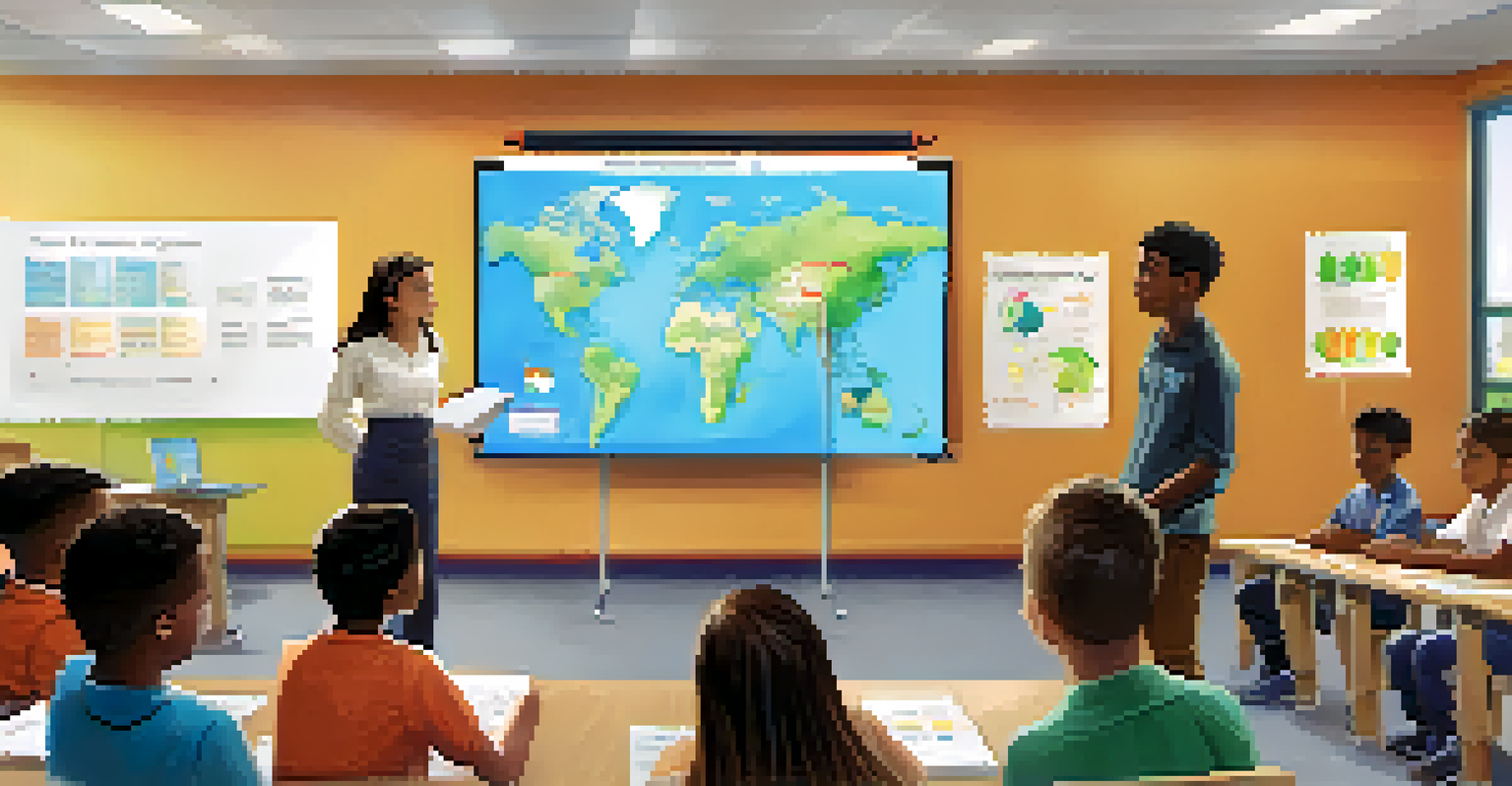Benefits of Project-Based Learning in Modern Education

Engaging Students Through Real-World Projects
Project-based learning (PBL) taps into students' natural curiosity by involving them in real-world challenges. This hands-on approach makes learning more relevant and exciting, as students can see the practical application of their studies. For instance, a project about renewable energy can spark interest in science while teaching valuable environmental lessons. By connecting academic content to real-life situations, PBL fosters a deeper engagement with the material.
Tell me and I forget, teach me and I remember, involve me and I learn.
Moreover, when students work on real projects, they often feel a sense of ownership over their learning. This ownership can lead to increased motivation and a willingness to explore topics beyond the classroom. Imagine a group of students presenting their findings on local recycling efforts; their passion for the subject can be contagious, inspiring their peers and the community. Such experiences not only enrich their education but also build confidence in their abilities.
Ultimately, engaging students through PBL helps bridge the gap between theory and practice. It transforms passive learning into an active exploration, allowing students to take charge of their education. As they dive into projects, they develop critical thinking and problem-solving skills that are essential for their future.
Fostering Collaboration and Teamwork Skills
One of the remarkable benefits of project-based learning is its emphasis on collaboration. Students often work in teams, which simulates real-world work environments where teamwork is crucial. In these collaborative settings, students learn how to communicate effectively, delegate tasks, and support one another, skills that are invaluable in both academic and professional contexts.

For example, during a group project on creating a community garden, students must coordinate their efforts, share ideas, and resolve conflicts. This experience teaches them the importance of listening and valuing different perspectives. As they navigate challenges together, they build strong interpersonal skills and develop a sense of responsibility towards their peers.
Boosts Engagement Through Real Projects
Project-based learning connects academic content to real-world challenges, enhancing students' relevance and excitement in their studies.
By fostering collaboration, PBL not only enhances learning but also prepares students for future workplaces. The ability to work well with others is a key competency that employers look for in candidates. Thus, PBL cultivates a collaborative spirit that extends beyond the classroom, equipping students with skills that will serve them throughout their lives.
Encouraging Critical Thinking and Problem-Solving
Project-based learning inherently encourages students to think critically and solve complex problems. Unlike traditional rote learning, PBL presents learners with open-ended questions and challenges that require thoughtful analysis and creative solutions. This approach pushes students to engage deeply with the content and develop their analytical skills.
The only way to do great work is to love what you do.
Consider a project where students are tasked with designing a product to address a community issue. They must research, brainstorm, and test their ideas, all while evaluating the feasibility of their solutions. This process not only sharpens their problem-solving abilities but also teaches them how to approach challenges methodically, breaking them down into manageable parts.
As they navigate these projects, students learn to embrace failure as part of the learning process. Instead of fearing mistakes, they begin to view them as opportunities for growth and improvement. This mindset shift is crucial for fostering resilience and adaptability, qualities that are essential in today's ever-changing world.
Enhancing Communication Skills
In project-based learning, clear communication is paramount. Students must articulate their ideas, present their findings, and collaborate with peers, which enhances their verbal and written communication skills. This frequent practice not only boosts their confidence but also prepares them for future academic and professional settings where effective communication is key.
For instance, during a project on local history, students might conduct interviews with community members and present their research to the class. This process requires them to craft compelling narratives and convey information in an engaging manner. Through these activities, they learn how to adjust their communication style based on their audience, a skill that is vital in any career.
Cultivates Collaboration and Skills
Working in teams during projects helps students develop essential collaboration, communication, and problem-solving skills for future success.
Moreover, the emphasis on communication in PBL fosters a sense of community within the classroom. When students share their ideas and feedback openly, they create an inclusive atmosphere where everyone feels valued. This collaborative environment not only enhances learning but also builds lasting relationships among students.
Promoting Self-Directed Learning
One of the standout benefits of project-based learning is its ability to promote self-directed learning. In PBL, students often take the lead in determining the direction of their projects, which encourages them to set goals, manage their time, and seek out resources independently. This autonomy fosters a sense of responsibility and empowers students to take charge of their education.
For example, when students choose a topic for their project, they engage in research and exploration based on their interests. This self-selection process makes learning more meaningful and relevant, as they are motivated to delve deeper into subjects they are passionate about. As a result, they become lifelong learners, curious and eager to expand their knowledge beyond the classroom.
Additionally, self-directed learning cultivates essential life skills such as organization and perseverance. Students learn to navigate obstacles and stay committed to their goals, skills that will serve them well in their future endeavors. Ultimately, PBL transforms students into proactive learners, ready to tackle challenges with confidence.
Building Connections Across Disciplines
Project-based learning encourages students to make connections across various subjects, fostering a holistic understanding of knowledge. Instead of viewing subjects in isolation, PBL allows learners to see how concepts from different disciplines interrelate. For instance, a project integrating science, mathematics, and art can help students understand the principles of design while applying mathematical concepts to create their models.
This interdisciplinary approach enriches the learning experience, as students draw on diverse skills and knowledge to solve problems. Imagine a project where students create a documentary about environmental changes; they would need research skills from science, storytelling techniques from language arts, and technical skills from media production. Such projects illustrate how interconnected knowledge is in the real world.
Prepares Students for Careers
PBL equips students with critical thinking and networking skills, preparing them for the demands of an evolving job market.
By building connections across disciplines, PBL prepares students for the complexities of modern life. It encourages them to think critically and apply their learning in multifaceted ways. Ultimately, this approach cultivates a well-rounded education, equipping students with the tools they need to navigate an increasingly interconnected world.
Preparing Students for Future Careers
In today’s rapidly evolving job market, the skills cultivated through project-based learning are more important than ever. Employers seek individuals who can think critically, collaborate effectively, and communicate clearly. PBL nurtures these competencies, ensuring that students are well-prepared for the challenges they will face in their careers.
Consider how a project that involves community engagement can help students develop valuable networking skills. By collaborating with local organizations and stakeholders, students learn the importance of building professional relationships and managing expectations. This experience not only enhances their resumes but also gives them practical skills that will benefit them in future job searches.

Moreover, by engaging in authentic projects, students gain insights into various industries and career paths. They can explore their interests and talents in a hands-on way, helping them make informed decisions about their futures. In essence, project-based learning serves as a stepping stone to career readiness, equipping students with the skills and experiences they need to thrive in the workforce.